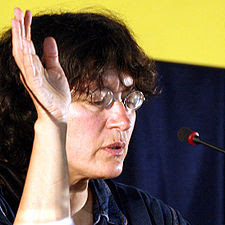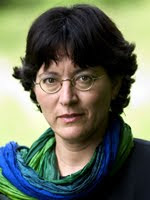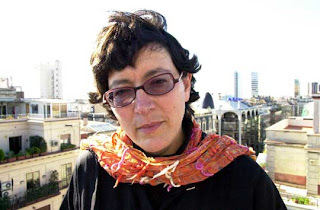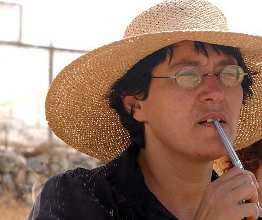Now let me see if I’ve got this right. The Guardian’s Comment is Free censors, or ‘moderators’ as they like to call themselves, search diligently for any sign or evidence of a comparison between Zionism and Nazi Germany, as such comparisons are, by definition ‘anti-Semitic’ or at least not acceptable to their liberal establishment friends.
But with typical liberal inconsistency, they then quote from Amira Hass, quite correctly, when speaking of her parents she says: “They knew what it meant to close people behind barbed-wire fences in a small area.”
Only a Jew can invert the “never again” logic of the Holocaust that is used to justify Israel’s least justifiable actions. It is that very experience, Hass argues, that should teach Israel to behave differently.” Perhaps, instead of demonstrating such abject cowardice, Comment is Free could take a leaf out of Amira Hass’s book?
Tony Greenstein
Editorial, The Guardian, Saturday 24 October 2009
Only Amira Hass could have received the International Women’s Media Foundation lifetime achievement award by saying her life as a journalist had been a failure. By her standards maybe, but then she sets them high. If her aim is to stop successive Israeli governments lying about what they do in the occupied territories, then it is true that the language laundromat, as she once put it, keeps on turning.
But make no mistake, the Haaretz columnist fully deserves this award. She is the only Israeli journalist to have lived in and reported from Gaza and Ramallah for much of the last two decades. In describing the effects of the occupation on the lives of Palestinians, she has been pilloried by Israelis and fallen foul of Hamas. Her moral anchor is firmly rooted in painful collective memories. Her mother survived a concentration camp and her father the ghettos of Romania and Ukraine. “What luck my parents are dead,” Hass wrote at the height of the Gaza operation in January. Her parents could not stand the noise of Israeli jet fighters flying over the Palestinian refugee camps in 1982, and nor could they have tolerated going about their daily chores in Tel Aviv with the knowledge of what was going on in their name in Gaza:
“They knew what it meant to close people behind barbed-wire fences in a small area.” Only a Jew can invert the “never again” logic of the Holocaust that is used to justify Israel’s least justifiable actions. It is that very experience, Hass argues, that should teach Israel to behave differently.
Lucky my parents aren’t alive to see this
By Amira Hass 26.1.09.
What luck my parents are dead. Back in 1982 they could not stand the noise of the Israeli jet fighters flying over the Palestinian refugee camps in Lebanon. The shriek of a plane horrified them in their house in Tel Aviv. We don’t have to see it to know, they said.
That’s how it was then. And what now, when from me they would have learned about 2-year-old Sham, who climbs nimbly onto the table to look at her sister drawing in her notebook; 5-year-old Tayyib with the space between his front teeth that shows when he smiles; or 6-year-old Carmel with the picture books she loves. The world is exploding around these children, again and again, just five or 10 meters away. For 10 days now, every minute is a minute of fear. Every minute of fear is a minute of death. Multiply that by a million and a half.
My parents despised all their everyday activities – stirring sugar into coffee, washing the dishes, standing at a crosswalk – when in their mind’s eye they saw, based on their personal experience, the terror in the eyes of children, the desperation of mothers who could not protect their young ones, the moment when a huge explosion dropped a house on top of its inhabitants and a smart bomb struck down entire families. Salmeh’s mother says: “When I wake up [from a restless sleep] I am surprised. I know it’s only by chance that I am alive.”
How would they have been able to stand their daily routine now, when they would hear from me about 70-year-old Umm Khaled. A bomb fell on the closed concrete room on the square in the Shabura refugee camp. Two civilians were killed. Dozens of houses made out of hollow concrete were severely damaged. An asbestos roof fell centimeters from Umm Khaled’s head. Only that persuaded her to “be evacuated” to her daughter’s house, half a kilometer away, under the illusion that a new house would be safer. “All I hope is that I die before I see something happen to you,” she repeatedly tells her children.
Even before the language laundromat developed to its current sophistication, my parents were nauseated by phrases like the “the war for peace in the Galilee” or “disturbances of public order” when the public order was the occupation and the disturbance was resistance to it. When order is preventing the Palestinians from having what the Jews have a right to and demand. What luck that they are not alive to hear Ehud Barak and Tzipi Livni explaining that we have nothing against the Palestinian people, and the cabinet secretary explaining that there is no humanitarian crisis and this is just Hamas propaganda. To recognize lies, they did not need to know the names of the people who had not had running water for five days or more. Forget the bombardments, forget the electricity, food, even sleep. But no water? Because of the bombardments by sea, land and air, people cannot even go out to get drinking water from the city faucets. And when someone does have running water at home, it’s undrinkable.
Because of my parents’ history they knew what it meant to close people behind barbed-wire fences in a small area. A year, five years, 10 years. From 1991. How lucky it is that they are not alive to see how how these incarcerated people are bombarded with all the glorious military technology of Israel and the United States. “We urgently invite Mohamed ElBaradei to come here and prove we do not have nuclear weapons,” says Iyad – a well-known comic, even under bombardment. But Saturday night he only said “difficult, difficult,” and hung up the phone.
My parents’ personal history led them to despise the relaxed way the news anchors reported on a curfew. How lucky they are not here and cannot hear the crowd roaring in the colosseum.



